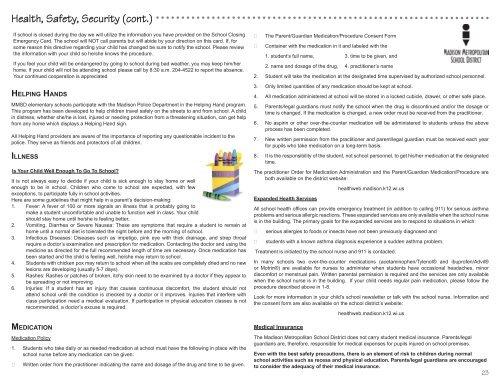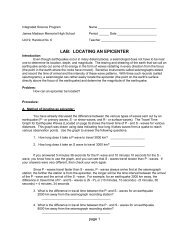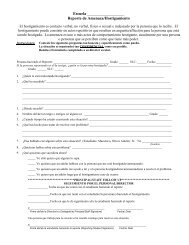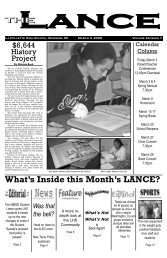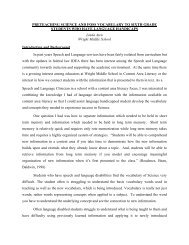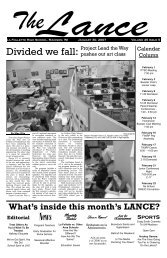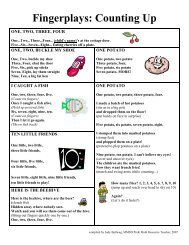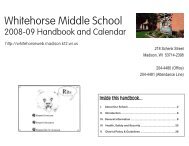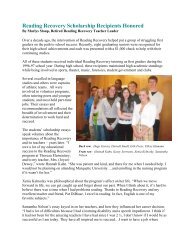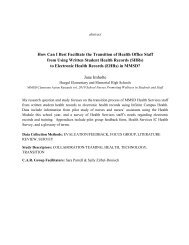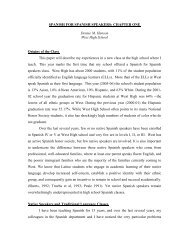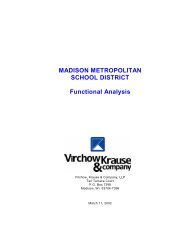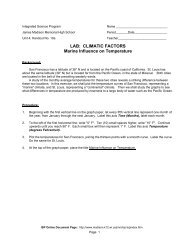Gompers Elementary School • 1502 Wyoming Way, Madison, WI ...
Gompers Elementary School • 1502 Wyoming Way, Madison, WI ...
Gompers Elementary School • 1502 Wyoming Way, Madison, WI ...
Create successful ePaper yourself
Turn your PDF publications into a flip-book with our unique Google optimized e-Paper software.
Health, Safety, Security (cont.)<br />
If school is closed during the day we will utilize the information you have provided on the <strong>School</strong> Closing<br />
Emergency Card. The school will NOT call parents but will abide by your direction on this card. If, for<br />
some reason this directive regarding your child has changed be sure to notify the school. Please review<br />
the information with your child so he/she knows the procedure.<br />
If you feel your child will be endangered by going to school during bad weather, you may keep him/her<br />
home. lf your child will not be attending school please call by 8:30 a.m. 204-4522 to report the absence.<br />
Your continued cooperation is appreciated<br />
He l p i n g Ha n d s<br />
MMSD elementary schools participate with the <strong>Madison</strong> Police Depart ment in the Helping Hand program.<br />
This program has been developed to help children travel safely on the streets to and from school. A child<br />
in distress, whether she/he is lost, injured or needing protection from a threatening situation, can get help<br />
from any home which displays a Helping Hand sign.<br />
All Helping Hand providers are aware of the importance of reporting any question able incident to the<br />
police. They serve as friends and protectors of all children.<br />
Il l n e s s<br />
Is Your Child Well Enough To Go To <strong>School</strong><br />
It is not always easy to decide if your child is sick enough to stay home or well<br />
enough to be in school. Children who come to school are expected, with few<br />
exceptions, to participate fully in school activities.<br />
Here are some guidelines that might help in a parent’s decision-making:<br />
1. Fever: A fever of 100 or more signals an illness that is probably going to<br />
make a student uncomfortable and unable to function well in class. Your child<br />
should stay home until he/she is feeling better.<br />
2. Vomiting, Diarrhea or Severe Nausea: These are symptoms that require a student to remain at<br />
home until a normal diet is tolerated the night before and the morning of school.<br />
3. Infectious Diseases: Diseases such as impetigo, pink eye with thick drainage, and strep throat<br />
require a doctor’s examination and prescription for medication. Contacting the doctor and using the<br />
medicine as directed for the full recommended length of time are necessary. Once medication has<br />
been started and the child is feeling well, he/she may return to school.<br />
4. Students with chicken pox may return to school when all the scabs are completely dried and no new<br />
lesions are developing (usually 5-7 days).<br />
5. Rashes: Rashes or patches of broken, itchy skin need to be examined by a doctor if they appear to<br />
be spreading or not improving.<br />
6. Injuries: If a student has an injury that causes continuous discomfort, the student should not<br />
attend school until the condition is checked by a doctor or it improves. Injuries that interfere with<br />
class participation need a medical evaluation. If participation in physical education classes is not<br />
recommended, a doctor’s excuse is required.<br />
Me d i c at i o n<br />
Medication Policy<br />
1. Students who take daily or as needed medication at school must have the following in place with the<br />
school nurse before any medication can be given:<br />
<br />
Written order from the practitioner indicating the name and dosage of the drug and time to be given.<br />
<br />
<br />
The Parent/Guardian Medication/Procedure Consent Form<br />
Container with the medication in it and labeled with the<br />
1. student’s full name, 3. time to be given, and<br />
2. name and dosage of the drug, 4. practitioner’s name<br />
2. Student will take the medication at the designated time supervised by authorized school personnel.<br />
3. Only limited quantities of any medication should be kept at school.<br />
4. All medication administered at school will be stored in a locked cubicle, drawer, or other safe place.<br />
5. Parents/legal guardians must notify the school when the drug is discontinued and/or the dosage or<br />
time is changed. If the medication is changed, a new order must be received from the practitioner.<br />
6. No aspirin or other over-the-counter medication will be administered to students unless the above<br />
process has been completed.<br />
7. New written permission from the practitioner and parent/legal guardian must be received each year<br />
for pupils who take medication on a long-term basis.<br />
8. It is the responsibility of the student, not school personnel, to get his/her medication at the designated<br />
time.<br />
The practitioner Order for Medication Administration and the Parent/Guardian Medication/Procedure are<br />
both available on the district website:<br />
Expanded Health Services<br />
healthweb.madison.k12.wi.us<br />
All school health offices can provide emergency treatment (in addition to calling 911) for serious asthma<br />
problems and serious allergic reactions. These expanded services are only available when the school nurse<br />
is in the building. The primary goals for the expanded services are to respond to situations in which:<br />
<br />
<br />
serious allergies to foods or insects have not been previously diagnosed and<br />
students with a known asthma diagnosis experience a sudden asthma problem.<br />
Treatment is initiated by the school nurse and 911 is contacted.<br />
In many schools two over-the-counter medications (acetaminophen/Tylenol® and ibuprofen/Advil®<br />
or Motrin®) are available for nurses to administer when students have occasional headaches, minor<br />
discomfort or menstrual pain. Written parental permission is required and the services are only available<br />
when the school nurse is in the building. If your child needs regular pain medication, please follow the<br />
procedure described above in 1-8.<br />
Look for more information in your child’s school newsletter or talk with the school nurse. Information and<br />
the consent form are also available on the school district’s website:<br />
Medical Insurance<br />
healthweb.madison.k12.wi.us<br />
The <strong>Madison</strong> Metropolitan <strong>School</strong> District does not carry student medical insurance. Parents/legal<br />
guardians are, therefore, responsible for medical expenses for pupils injured on school premises.<br />
Even with the best safety precautions, there is an element of risk to children during normal<br />
school activities such as recess and physical education. Parents/legal guardians are encouraged<br />
to consider the adequacy of their medical insurance.<br />
23


